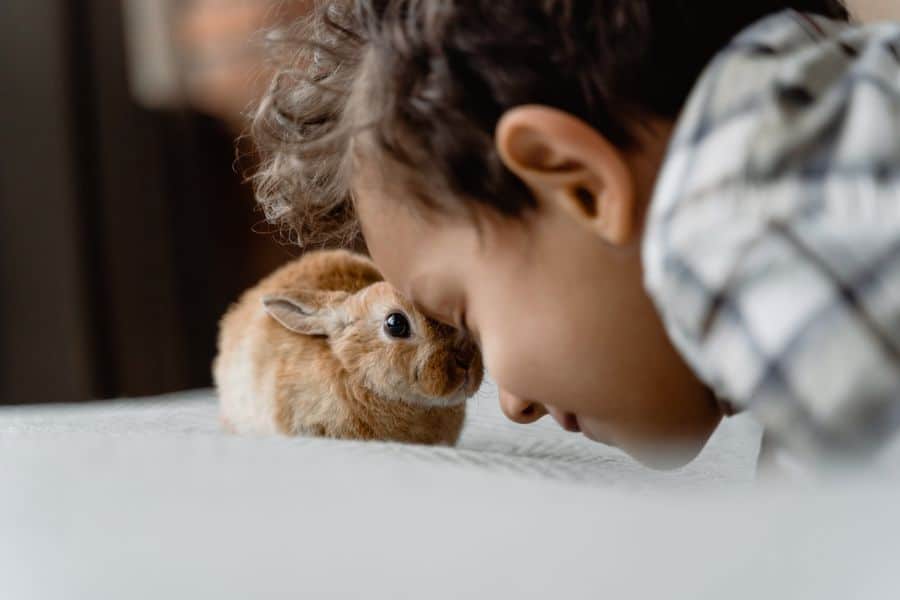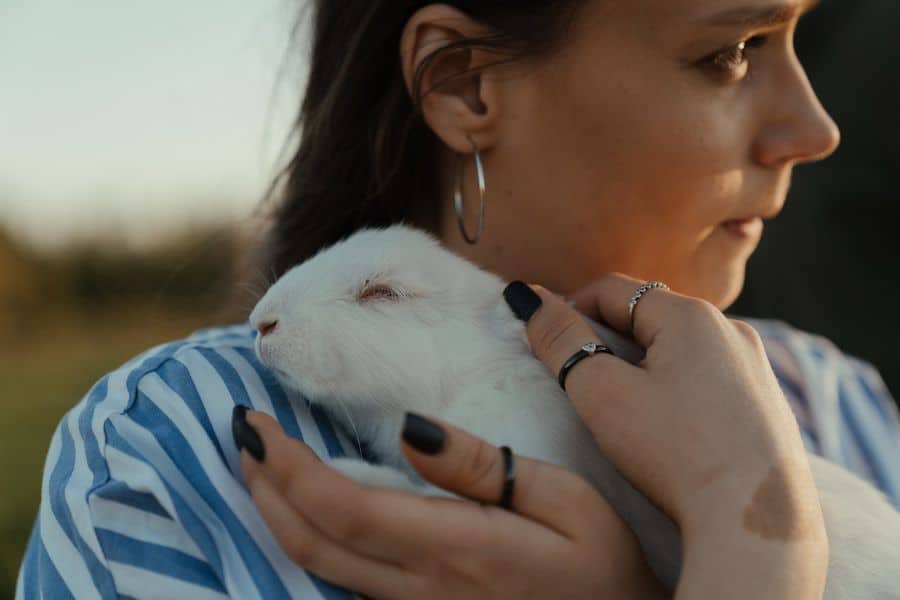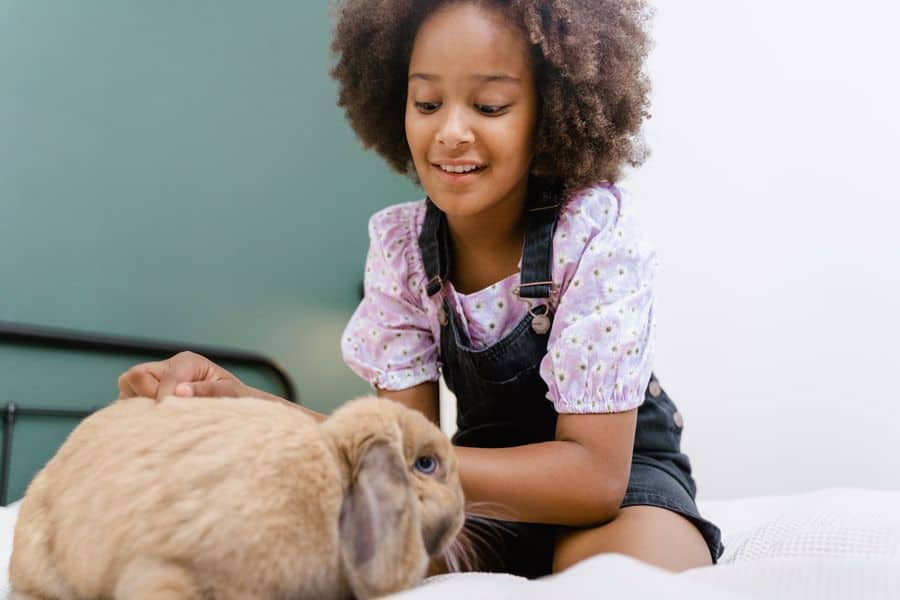Why is my rabbit breathing so fast? While rabbits have a faster breathing rate than humans, there are times when rapid breathing can be a symptom of an illness. This is why we’re sharing the common reasons why a rabbit may breathe faster than normal and what you can do about it.
Contents
Why Is My Rabbit Breathing So Fast?
Your rabbit may be breathing so fast due to infections, allergies, injuries, and other medical conditions. Additionally, a blocked nose, fear, and plant poisoning may cause a bunny to breathe faster than usual. Rapid breathing may also be an effect of secondhand smoking, exercise, or temperature.
There are typical causes that would disappear right away. However, there are reasons accompanied by other symptoms that may potentially become a long-term health problem. It’s crucial that you can determine them to provide the appropriate care.
Medical Condition
A medical condition is one of the main reasons rabbits breathe so fast. It may come from a virus, respiratory infection, and allergies.
- Heart disease: When heart disease progresses, your rabbit may breathe more rapidly for prolonged periods. In later stages, it may even have occasional fainting spells.
- Tumor: A rabbit may also breathe faster than usual due to lung, nose, or thymus gland tumors. This is because tumors affect the tissues of the respiratory system.
- Allergies: Some rabbits may be more sensitive than others. This may cause them to breathe faster when in contact with dust, wood shavings, cleaning products, or air fresheners.
- Rabbit Haemorrhagic Disease: This nasty virus attacks the internal organs, causing internal bleeding. A rabbit with this virus may try to breathe fast as a response to the pain.
- Myxoma: The myxoma virus spreads through mosquito bites, especially during summer and fall. It targets the lungs, causing a rabbit to breathe rapidly.
Injuries
Another reason why your rabbit is breathing so fast is due to injuries caused by fighting. When you leave your bunny alone with an aggressive rabbit or other big pets, they may end up attacking each other. The injuries would cause shock and trauma to your pet, triggering a breathing issue.
Blocked Nose
Your rabbit can’t breathe through the mouth, so a blocked nose would make breathing more difficult. Hay or grass stuck up in the nose or throat may cause this. In some cases, it may be due to a bacterial infection.
You may also notice other symptoms like a constant rapid opening of the mouth, nasal discharge, and blue-tinted lips that indicate low oxygen levels.
Physical Activities
Rabbits would increase their breathing rate after doing physical activities like playing or exercising. You may observe this after your pet zooms around the room.
Fear
Short bouts of fear due to anxiety and stress are also factors that cause a rabbit to breathe too fast.
- If there’s a new rabbit or other pets like dogs or cats, some rabbits tend to think they need to escape, causing them to breathe rapidly or sit in one spot.
- Your rabbit may breathe fast and shake if it doesn’t want to be picked up or you handled its body wrong.
- A rabbit may also breathe faster if it detects the presence of a stranger.
Hot Temperature
Rabbits breathe to regulate body temperature. The faster your pet breathes, the more it removes body heat. This is why it’s normal for rabbits to breathe fast during the summer months.
Plant Poisoning
If rabbits eat poisonous plants like buttercups, mistletoe, primrose, ivy, or nightshade, they will try to breathe fast to compensate for oxygen deprivation.
Rabbits are plant-loving animals. However, rabbits would have limited plants to eat in captivity. When rabbits have the chance to roam around the house or a garden, they may accidentally eat anything green or even a toxic plant that tastes good to them.
Passive Smoking
Pets breathe secondhand smoke at home. If your rabbit has an extremely sensitive respiratory tract, it may also breathe faster due to the effect of tobacco smoke.
Tobacco smoke contains over 7,000 chemicals that are toxic to people and pets. These chemicals may linger in the air, surfaces, furniture, and even your rabbit’s fur.
What Should I Do If My Rabbit Is Breathing Rapidly?
A healthy rabbit should have a breathing rate of 30-60 breaths per minute when at rest. For context, normal human respiration has about 12 to 16 breaths per minute.
It may be a warning sign if your pet goes beyond the average rate. In such cases, there are several things you can do to help your rabbit.
- Schedule a routine check-up with our clinic to rule out any medical conditions.
- Keep the enclosure clean and choose a spot with favorable temperatures.
- Keep your rabbit healthy by feeding it fiber-rich foods like leafy greens.
- Get your rabbit vaccinated against fatal diseases like myxoma and Rabbit Haemorrhagic Disease.
- Bond with your rabbit to remove anxiety when in contact with humans.
- Give your rabbit some space if it’s breathing faster due to stress.
- If your rabbit is breathing so fast while showing other symptoms, book an emergency vet appointment to provide the best treatment, medication, and recovery care.
Related Questions
Why Is My Rabbit Not Eating?
If your rabbit is not eating, it may be because of stress, dental issues, or gut problems. A pet that is not eating and losing weight can be a symptom of a severe health condition, so be sure to bring your rabbit to our clinic for examination.
Why Does My Rabbit Eat Too Much?
If your rabbit is eating too much, it may be because of shedding, breeding season, or self-regulating to prevent overeating. Furthermore, rabbits are grazing animals, so they can naturally eat whenever they want. Rabbits grow their appetite as they mature, so it’s not normally a cause of concern.
Conclusion
A rabbit may breathe too fast because of medical issues, a blocked nose, stress, passive smoking, exercise, or temperature. Be wary of the symptoms so you’ll know the best way to act. Should the breathing pattern become unusual, and come along with other symptoms, go to our clinic right away for proper treatment.



